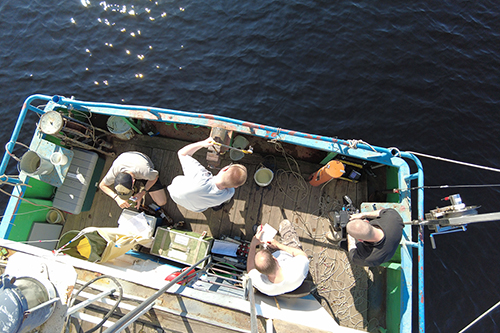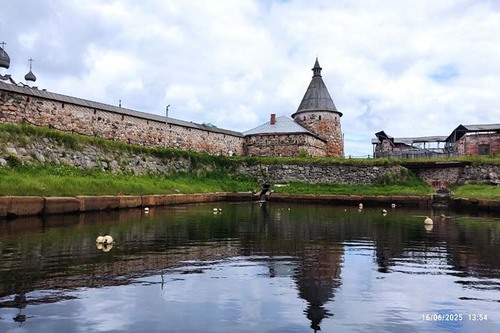— The study area is remarkable for its special ecological conditions. Its landscapes are contrastingly different from other areas of Lake Onego. Living organisms develop here in quickly warmed shallow waters, often with abundant aquatic vegetation, under poor water exchange with the lake's open regions, and under significant anthropogenic pressure. In this study, we will determine a wide range of indices and compare them against the open part of Lake Onego. The last time, biota studies in the archipelago waters were conducted some 30 years ago. Simultaneous sampling of hydrochemical as well as hydrobiological parameters has never been done in this area. This project will be the first time when an integrated assessment of the present-day biological and major chemical parameters of the Kizhi Skerries' aquatic ecosystem will be performed, — told Anastasiia Sidorova, Research Leader, Senior Researcher at the Hydrobiology Laboratory of the Northern Water Problems Institute KarRC RAS.
Samples will be collected at 9 stations at depths ranging from 2 to 15 meters. The researchers will study the taxonomic composition, quantitative and productivity metrics of aquatic organisms: phytoplankton, zooplankton and macrozoobenthos, size and age composition of fish. The chemical component of the project involves the determination of sodium, potassium, calcium, magnesium, chlorine, sulfate, phosphorus, nitrogen ions, oil products, heavy metals and other substances in the water.
— We use the monitoring stations from 1994 and add new points for observation. For example, special attention should be given to the area where tourist boats travel from the village of Oyatevshchina to the island. The concentrations of oil products there may exceed the permissible maximum (MPC). It is also important to study the discharge areas of domestic wastewater from Kizhi Island. Additional sampling stations have been established there as well. The project will assess the water quality based on microbiological indices and its sanitary condition, including E. coli content, — remarked Anastasiia Sidorova.
Preliminary analysis of the data obtained for the last year showed that the chemical composition of water at all the sampling stations was similar to that in the central region of the lake. Water was characterized by low content of total dissolved solids, organic matter and nutrients.
— Maximum permissible concentrations in the water around Kizhi Island were exceeded only for oil products, which is a result of heavy water traffic, and for iron, manganese and copper, which is a natural regional feature rather than a sign of contamination. At the same time, the microbiological indices indicated the presence of potentially pathogenic microflora, being higher than the thresholds for water bodies used for recreational purposes in almost all samples, — the biologist added.

Anastasiia Sidorova, Research Leader, Senior Researcher at the Hydrobiology Laboratory of the Northern Water Problems Institute KarRC RAS
In addition, scientists study disorders in the embryonic development of a freshwater crustacean – the Baikalian amphipod Gmelinoides fasciatus. It is regarded as an indicator species, which is highly sensitive to environmental pollution. Activities of this kind will be done for Lake Onego for the first time. Anastasiia Sidorova specializes in this species. An article was published this July, presenting the results of a study of benthic communities in the littoral zone of Lake Onego. Special attention is given to the Baikal amphipod. The species is of Baikalian origin and is invasive (alien) in Lake Onego. It appeared in European Russia about 60 years ago through intentional introduction for improving foraging resources for fish. In Lake Onego, the Baikal amphipod was first found in 2001. Scientists say this alien species has expanded its range over the past 20 years.
Another important component of the study will be under-ice surveys scheduled for the beginning of next year.









